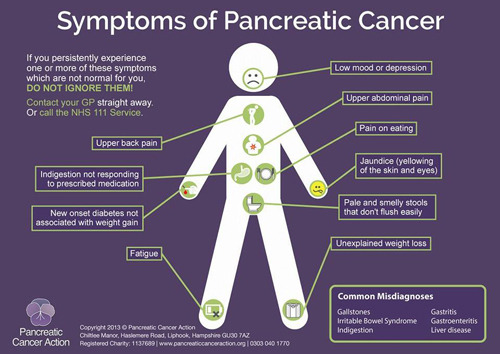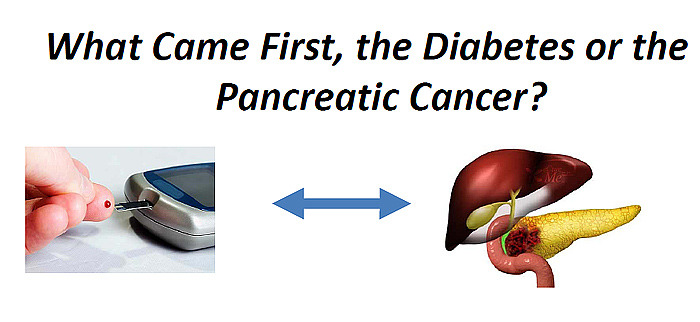
Pink Hair



November is Pancreatic Cancer Awareness Month

Sudden Onset Diabetes and the Risk for Pancreatic Cancer
Type II diabetes is a metabolic disorder that is characterized by high blood sugar in the context of insensitivity or deficiency of insulin. Some known risks for developing type II diabetes are obesity, women who had gestational diabetes while pregnant, people with metabolic syndrome, and people with a history of type II diabetes in their families. It is now an epidemic in the United States.
In 2010, the Centers for Disease Control estimated that there were 819,000 new diabetics ages 40 to 59 and 536,000 new diabetics aged 60 and above. Unfortunately, diabetics are at higher risk for multiple medical problems including nerve, blood vessel, and eye diseases. Emerging data now suggests that pancreatic cancer can be added to this list.
We asked Jason Sicklick, MD, assistant professor of surgery in the Division of Surgical Oncology at the UC San Diego Moores Cancer Center three questions about the link between these two diseases.
Question: What is the relationship between new onset diabetes and pancreatic cancer? Is it dependent on a person’s age or their type of diabetes?
Answer: Recent data suggests that diabetes is both a risk factor for pancreatic cancer as well as an outcome of the cancer. Neither diabetes nor pancreatic cancer is rare. The National Cancer Institute estimates that there were 43,140 new cases of pancreatic cancer in the U.S. in 2010. Approximately 1% of diabetes patients over 50 years old will be diagnosed with pancreatic cancer within 3 years of first meeting criteria for diabetes. Moreover, those patients aged over 70 years old that develop new-onset diabetes have a 9-fold higher risk of having pancreatic cancer than the general population.
Q: What is the relationship between chronic diabetes and pancreatic cancer?
A: 85% of patients with pancreatic cancer have elevated blood sugar levels or frank diabetes. Recent data has demonstrated that patients with diabetes are at increased risk for developing pancreatic cancer . After reviewing data on 278,761 diabetic patients and 836,283 non-diabetic patients, researchers found that patients with diabetes were 3.2 times more likely to develop pancreatic cancer than controls (e.g., frequency of 0.9% versus 0.3%). Together, emerging data now strongly suggests that the medical community has vastly underappreciated the association between diabetes and pancreatic cancer.
Q: Unlike colon, breast, and prostate cancers, there is currently no screening program for pancreatic cancer. When should a patient speak with his or her doctor about the possibility of pancreatic cancer?
A: Survival rates after the diagnosis of pancreatic cancer are poor. Long-term survival usually requires diagnosis at an early stage when patients can undergo surgical removal of the tumor. Unfortunately, late stage diagnoses are often more common. Several studies have investigated the utility of pancreatic cancer screening of the general population with blood work but these have failed to yield any utility in making earlier diagnoses. However, based on current knowledge, Americans over the age of 50 years old with new onset diabetes should talk with their physician about the possibility of pancreatic cancer with the caveat that only a small fraction of them will actually have the disease.


#cigaretteskill
Motörhead “Heroes” (David Bowie Cover)
MusicFilter – Go ahead PUNK…make my day.
Best Man Forever


My rolls Royce triple black.. “Rick Ross – Blowin money fast”
